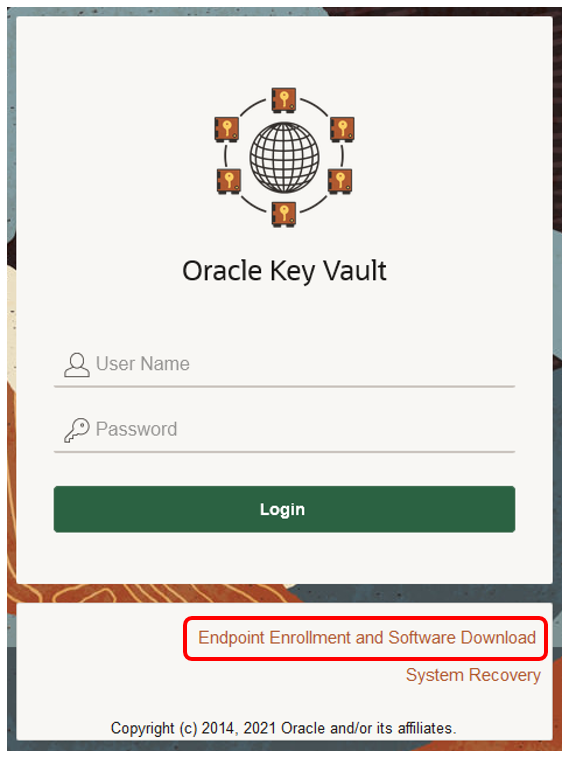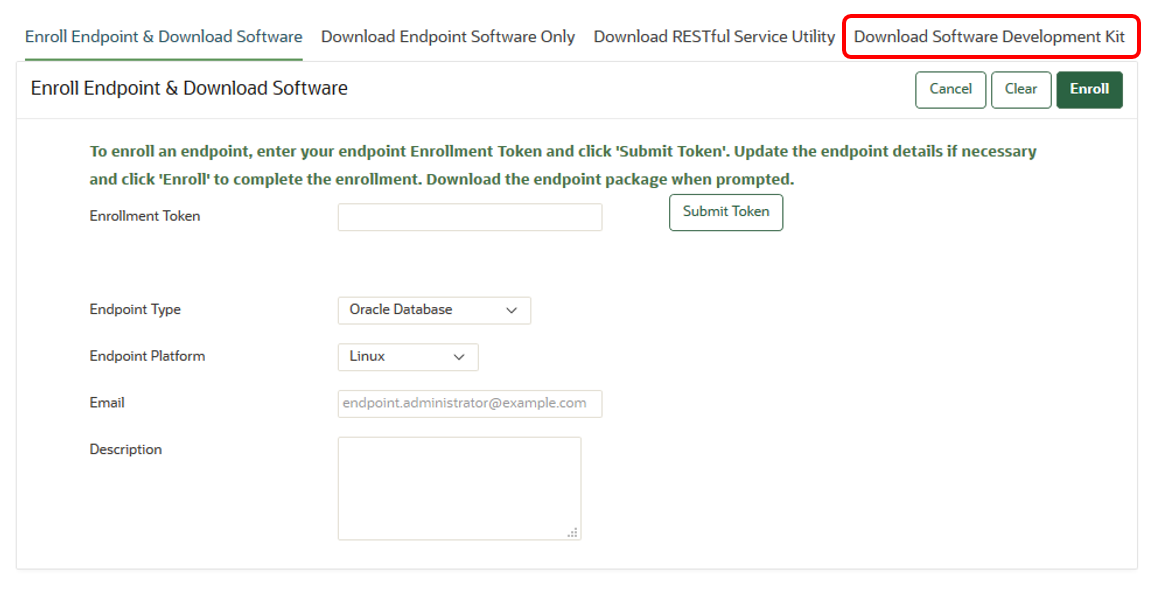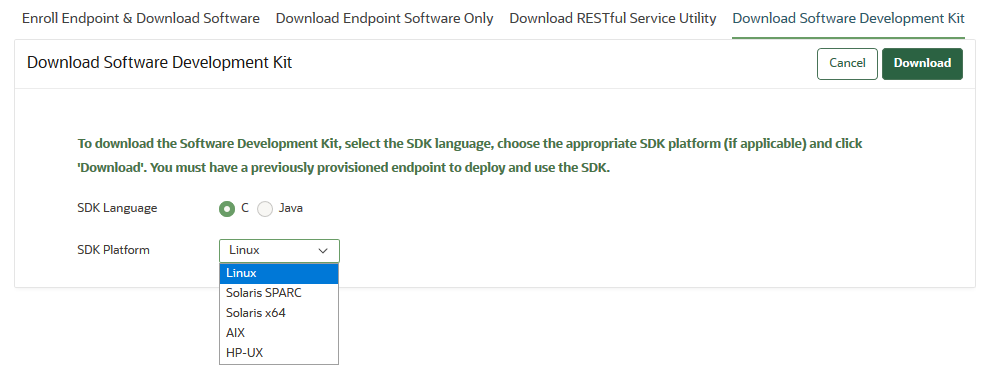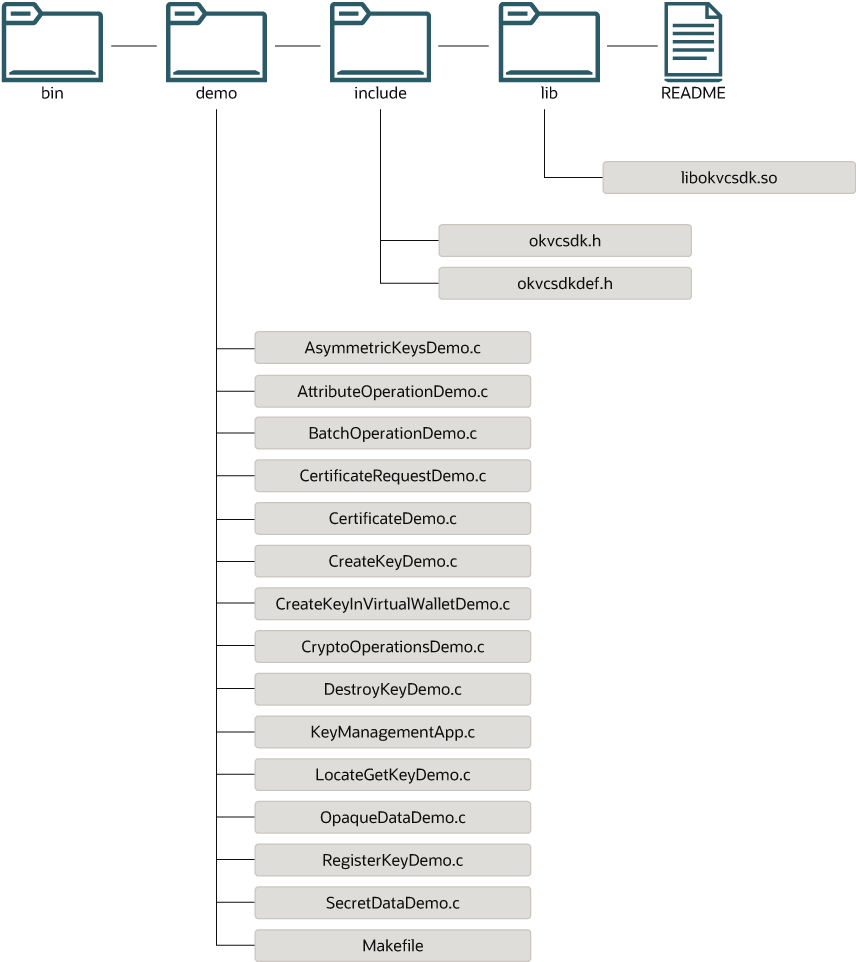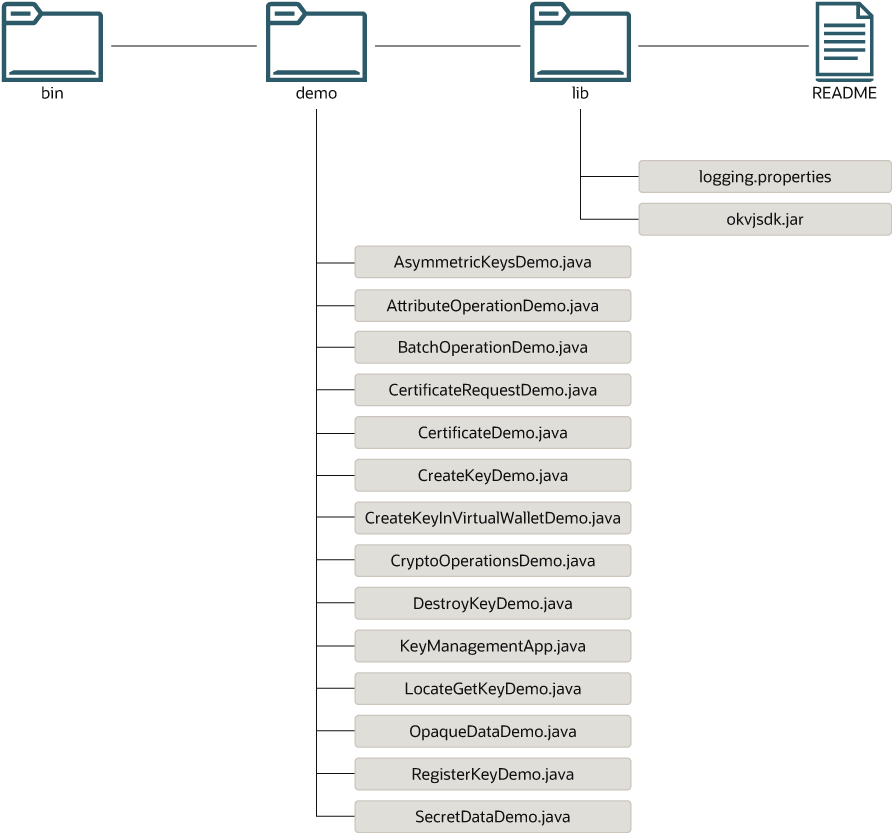4 Setting Up the Oracle Key Vault SDK
The client SDK is available in both C and Java.
- Enrolling an Endpoint
An Endpoint must be registered and enrolled to the Oracle Key Vault server before downloading the SDK content to that endpoint. - Downloading the C or Java SDK Software
You must download the appropriate Software Development Kit (SDK) software, either the C or Java version. - Contents of the C SDK File
The contents of C SDK file include demo programs, the SDK library file, and other necessary files. - Contents of the Java SDK File
The contents of Java SDK file include demo programs, the SDK library jar file, and other necessary files.
Parent topic: Introduction to the Oracle Key Vault Client SDK
4.1 Enrolling an Endpoint
An Endpoint must be registered and enrolled to the Oracle Key Vault server before downloading the SDK content to that endpoint.
If the endpoint is not already registered and enrolled before downloading the SDK, please enroll the endpoint by following the instructions from Enrolling Endpoints for Oracle Key Vault.
Parent topic: Setting Up the Oracle Key Vault SDK
4.2 Downloading the C or Java SDK Software
You must download the appropriate Software Development Kit (SDK) software, either the C or Java version.
Parent topic: Setting Up the Oracle Key Vault SDK
4.3 Contents of the C SDK File
The contents of C SDK file include demo programs, the SDK library file, and other necessary files.
The include directory contains header files for C SDK APIs. The
lib directory contains the shared library object.
bin is an empty directory to place the demo program object files
and executables.
The demo directory contains sample programs which demonstrate the
use of the C SDK APIs. The table below provides a brief description of each sample
program.
Table 4-1 Sample Programs
| Sample Program | Description |
|---|---|
AsymmetricKeysDemo.c |
Application for Asymmetric Keys management operations such as register, activate, get, get all attributes of private and public keys. |
AttributeOperationDemo.c |
Application for KMIP attribute operations such as add, modify, get, and delete attributes. |
BatchOperationDemo.c |
Application to demonstrate batching such as batching of create, activate, add attribute, get key, and destroy operations. |
CertificateDemo.c |
Application for Certificate management operations such as register, activate, get certificate and get all attributes. |
CertificateRequestDemo.c |
Application for Certificate Request management operations such as register, get certificate request and get all attributes. |
CreateKeyDemo.c |
Application for KMIP create and activate key operations. |
CreateKeyInVirtualWalletDemo.c |
Application for KMIP create key operation in the given wallet and activate the key. |
CryptoOperationsDemo.c |
Application to demonstrate encrypt and decrypt operations. |
DestroyKeyDemo.c |
Application for KMIP locate operation by given name and destroy the key. |
KeyManagementApp.c |
Application for Key management operations such as create, activate, get, deactivate, and destroy key. |
LocateGetKeyDemo.c |
Application for KMIP locate operation by given name and get the key details like key length, algorithm, and value. |
OpaqueDataDemo.c |
Application for Opaque Data management operations such as register, get, add attribute, and destroy opaque data. |
RegisterKeyDemo.c |
Application for KMIP register key operation. |
SecretDataDemo.c |
Application for Secret Data management operations such as register, activate, add attribute, deactivate, and destroy secret data. |
See the README file provided with the C SDK for complete
instructions about environment configuration, compiling, and running the demo
programs.
Parent topic: Setting Up the Oracle Key Vault SDK
4.4 Contents of the Java SDK File
The contents of Java SDK file include demo programs, the SDK library jar file, and other necessary files.
The lib directory contains the Oracle Key Vault Client Java SDK jar
file okvjsdk.jar and sample java.util.logging
configuration file logging.properties. bin is an empty
directory to place the Java demo program class files.
The demo directory contains sample programs which demonstrate the
use of the Java SDK APIs. The table below provides a brief description of each sample
program.
Table 4-2 Sample Programs
| Sample Program | Description |
|---|---|
AsymmetricKeysDemo.java |
Application for Asymmetric Keys management operations such as register, activate, get, get all attributes of private and public keys. |
AttributeOperationDemo.java |
Application for KMIP attribute operations such as add, modify, get, and delete attributes. |
BatchOperationDemo.java |
Application to demonstrate batching such as batching of create, activate, add attribute, get key, and destroy operations. |
CertificateDemo.java |
Application for Certificate management operations such as register, activate, get certificate and get all attributes. |
CertificateRequestDemo.java |
Application for Certificate Request management operations such as register, get certificate request and get all attributes. |
CreateKeyDemo.java |
Application for KMIP create and activate key operations. |
CreateKeyInVirtualWalletDemo.java |
Application for KMIP create key operation in the given wallet and activate the key. |
CryptoOperationsDemo.java |
Application to demonstrate encrypt and decrypt operations. |
DestroyKeyDemo.java |
Application for KMIP locate operation by given name and destroy the key. |
KeyManagementApp.java |
Application for Key management operations such as create, activate, get, deactivate, and destroy key. |
LocateGetKeyDemo.java |
Application for KMIP locate operation by given name and get the key details like key length, algorithm, and value. |
OpaqueDataDemo.java |
Application for Opaque Data management operations such as register, get, add attribute, and destroy opaque data. |
RegisterKeyDemo.java |
Application for KMIP register key operation. |
SecretDataDemo.java |
Application for Secret Data management operations such as register, activate, add attribute, deactivate, and destroy secret data. |
See the README file provided with the Java SDK for complete
instructions about environment configuration, compiling, and running the demo
programs.
Parent topic: Setting Up the Oracle Key Vault SDK
